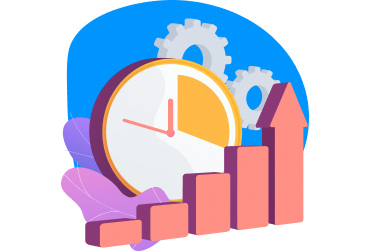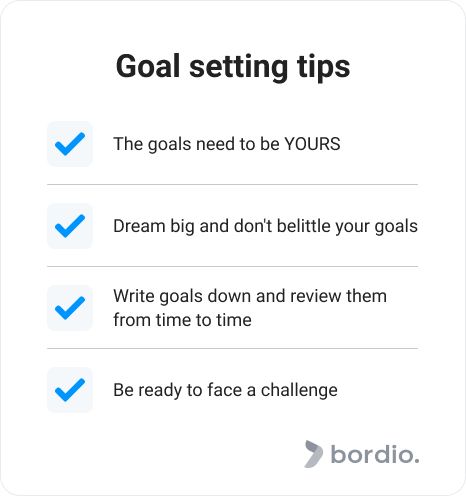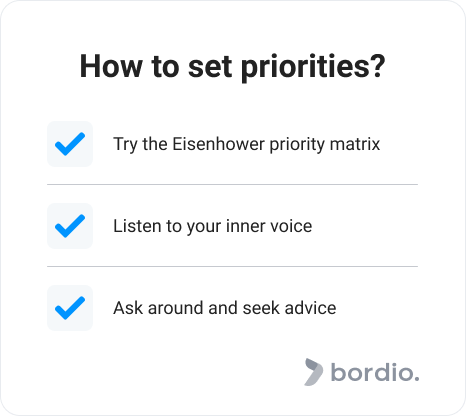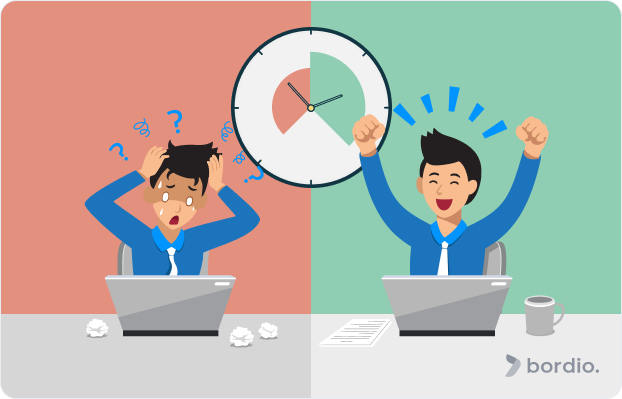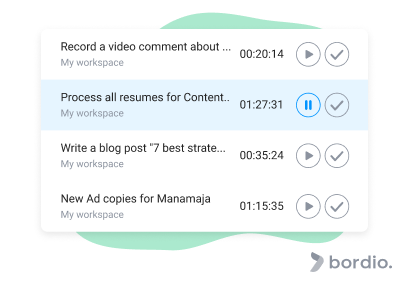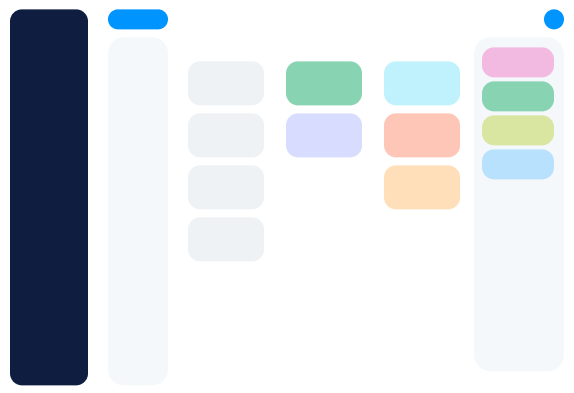Being productive is a journey, not a destination.
Just like you can’t learn a foreign language for two years and consider yourself done for life, you cannot read a productivity book, take some ideas from it, and assume that you will be productive forever. In reality, it takes work and effort to gain the ability to plan and learn to concentrate. Fortunately, not only books but also a time planner can help you with this.
Everyone has room for improvement when it comes to productivity, personal development, or time management. And sometimes, it’s enough to adopt a few minor habits to change our patterns or the course that we’re taking.
And if you are looking for productivity tips that really work, please check the 22 tips that we share in this article today.
# 1 Set goals: long- and short-term
Setting goals is a vital activity. No matter where you are and what you do, having goals makes you focused, productive, driven. And it guides you in your day to day life, helping you stay on track and work towards something bigger. Therefore, having set the tasks it will be correct to transfer them to work management systems that will help with load control.
Clear goals help you stay focused and organized even when a bunch of small tasks are stealing your attention. And on the days when you are overwhelmed and unsure what to work on, remembering your goals will suggest what you should get your hands on first. Some tasks in general it is better to transfer to those who will be more professional, for example, if your team has so many tasks, it is worth using the services of startup marketing agencies to perform some of the marketing tasks.
It can be intimidating to think about goals and say them out loud. Yet, we strongly recommend that you brainstorm and really think about what you want. Set goals in the daily schedule planner and strive for them.
Here’s a couple of suggestions for your goal-planning session:
- Make sure the goals are yours. We are often influenced by others, so it’s important to distinguish your true goals from something you’ve seen successful people mention or do.
- Don’t be afraid to dream big. Anything is possible with time and effort. Don’t intentionally belittle your goals because you’re afraid they won’t come to life.
- Write your goals down and check them regularly. You can use the schedule maker. It’s one thing to have a thought about something, but it’s completely different if you have it on paper. Somehow, written goals feel more real and hold more value. Plus, if you have them written down, you can come to them every once in a while to see the big picture and get that motivation boost.
- Be prepared to face a challenge. Some goals will be easier to accomplish, but others will be more challenging. It helps to recognize it during the planning stage. That way, you are less likely to drop the goal once the first hurdle comes along.
#2 Create a monthly, weekly, and daily plan to help stay on track with goals
Some people think that those who plan their days are wasting time. In reality, it is the opposite, and we save time by scheduling our days and weeks in schedule planner.
Nothing gets done if you don’t know what needs to be done. We all know those people who waste their days away on low priority tasks or walk from their desk to the coffee machine and back 20 times a day. And then suddenly, they realize that a few important tasks must be finished by the end of the day, so they rush to their computer to work on them, get nothing done, panic and make mistakes along the way. Those are the same people that complain about not having enough time when really, they just don’t know what to do with it.
A plan supports your goals and helps prioritise tasks. With daily, weekly, and monthly to-do lists, we are less likely to get caught up with insignificant things and more likely to maintain our vision and reach our goals and dreams.
#3 Set priorities and do the top stuff first
Let’s say you have your goals established and written down. You have a weekly and daily plan that you update and work on. But something still doesn’t feel right. Somehow, important projects remain unfinished, and you are not a bit less overwhelmed than you were before. Prioritize and do time allocation in time planner.
If you are in that position, it is likely because you haven’t figured out your priorities. It’s not enough to have an online to-do list with ten things on it to be productive and cross them all out in the evening.
Productivity is down to how much of the important stuff gets down rather than how many positions on your list are completed. For example, today, you plan to wash dishes, check emails, reply to that angry client with a business proposal, make a doctor’s appointment, and take out the trash. It’s easy to guess what really needs to be done and what is okay to be looked into the latest.
Sadly, in real life, the to-dos are a bit more complicated and less obvious. So if you struggle with assigning correct priorities, there are different ways that you can approach it:
- Follow the Eisenhower matrix. You will see what tasks are urgent and important or non-urgent and important. Once you know what it is, you will make better progress.
- Follow your gut. What do you think of the most? What bothers you the most?
- Ask for advice. There is no shame in seeking help if you’re a little lost. Reach out to your manager or mentor, and talk to your partner.
#4 Define key time wasters and distractions
We all get distracted and waste time from time to time. It’s a perfectly natural thing for human beings but it is something we can work on.
Productive people waste their time too but they acknowledge their behavior, identify key issues, and work on it. Use portable weekly schedule maker to avoid wasting time and properly allocate time for productive activities without forgetting about rest. So, do a little field research and try to catch the moments when you get distracted or start wasting time. Make a mental note or write them all down. Once you know what’s holding you back, you can take care of it and increase productivity.
Also, please note that it should be a regular activity. Things change, so it’s good to keep an eye on yourself and stop any new distractions as soon as they come up.
Some people say that it helps them to schedule time for distractions or procrastination. For example, they have their online daily planner packed with tasks but keep a 20-minute time slot for checking Instagram, browsing articles, and chatting with friends. Because they know that they’ll have time to play with their phone later, they are able to focus on the core work and report higher productivity.
#5 Remove distractions and time wasters
Once you know exactly what the key issues for your productivity are, you can remove them from your surroundings and avoid distractions or time waste.
Please remember that messages, social media notifications, and even emails are not urgent. It’s a good business practice to respond to the email within 24 hours, so you are under absolutely no obligation to drop what you’re doing and type the reply ASAP.
Similarly, it is not rude to decline phone calls from a friend or family member when working. And your colleagues can discuss their vacation plans over lunch, and not when you are going through the most important tasks of the day.
#6 Write things down
A project idea, a chore you need to do, a random thought – write them down!
Unless you’ve lived under a rock for the past ten years, you are well aware of how crazy and busy our lives are. Every day we face lots of decisions, questions, dilemmas. And, somehow, we are supposed to stay sane! One way to reach that is through writing things down. That way, we don’t forget about different tasks and plans. So use digital planner daily, writing things done in it.
It takes a lot of effort and energy for us to remember everything, so it’s well worth helping ourselves out and reducing the stress of having to keep 100 things in mind during the day.
Bonus tip: Bordio’s free weekly planner has a separate waiting list section exactly for such things that you need to brain dump and deal with later.
#7 Create a single to-do list for ALL your tasks
How many times do we forget to do something because we write it down at random places and then never see this note again? If you have a separate to-do list for work, another one for hobbies, the third one for family matters, and so on, the chances are you never accomplish half of the things you plan.
When people create multiple to-dos, it becomes a chore just to go through them all. And that’s not what we want. One of the keys to increasing your productivity is to make things easy. The less effort each step and task take, the more likely you are to reach the end goal.
A to-do list can be digital or paper-based. You can do this easily using free task organizer online or just in the paper planner. If you are more into technological to-dos, then give Bordio a try. It helps plan your days and weeks easily via a convenient calendar planner. Plus, it has a waiting list for all the unscheduled tasks. So, if you want to write down a few things but are not sure when you’ll be doing something about them, you can put them on the waiting list. It is located to the right from the calendar, so it’s easy to check the items there as you’re planning your days.
#8 Have a waiting list of tasks in your pocket
We’ve just touched on the waiting list from Bordio but let’s go into more details about why having a waiting list increases productivity and helps stay focused.
When we think about wasting time, we imagine watching TV, browsing the internet mindlessly, or gossiping about most random things. However, constantly thinking about all 400 tasks we have to do and ideas we want to bring to life is not productive either. And you might not notice it, but your subconscious has all those things circling in your brain, making you more stressed, distracted and affecting your mental health.
That’s where waiting lists come to play. Once you write something down, it’s settled. You no longer need to keep it in your memory, so your brain can relax a little bit. Of course, it’s important to check the waiting list periodically and start working on some of the points you’ve written down. However, the most important is to write it down once you have thought about it.
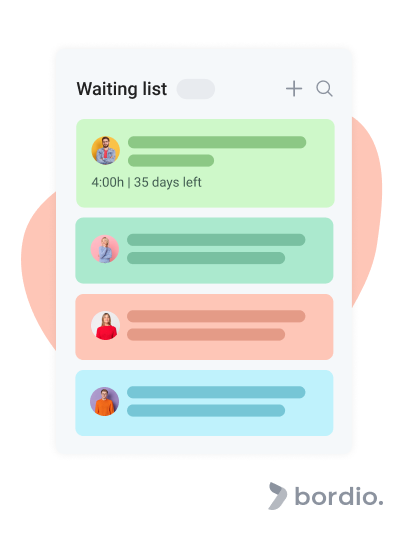
This productive habit has helped millions of people globally to stay organized, minimize distractions, save time, and gain back control of when they think about and work on a specific task.
Ps, if you’d like to work out all the ideas that you think about, structure them and create a feeling of peace in your head, check out our blog post where we dive deep into the Mind Sweep concept from Getting Things Done creator David Allen.
#9 Prepare for tomorrow today
We don’t suggest you do an elaborate analysis of your tomorrow’s to-do list and think through the steps you’ll need to take. It’s enough to have a 5-10 minute review of your commitments to get ahead.
This extra step helps you get a general idea of what expects you the next day and feel less overwhelmed when that day comes. You can have a quick thought about the priorities and the order that you’ll need to do the tasks in. If you have calls to make or places to go, it is helpful to have a mental note of those events and plan the logistics.
Plus, if one of tomorrow’s tasks requires help or input from someone else, or maybe you need additional materials, you won’t be caught by surprise. Instead, you’ll plan in advance to get what you need and arrange it early in the day to finish the task before clocking out.
Bonus tip: Many successful people prepare for the upcoming day in advance. If you struggle to build this habit, find someone you admire and use their routine as an inspiration. And if you’re not sure where to start, our article on how successful people plan their days will give you the boost.
Overall, preparing for tomorrow today gives you a vision and sets you up for a productive day, so why not give it a try?
#10 Review your week on the last working day before the weekend
What do you usually do on a Friday afternoon? Many people spend those last few hours dreaming about the weekend, counting minutes before they get to leave and chat with colleagues to fill in the time.
Imagine that instead of those unproductive activities, you have a critical look at your week: completed tasks, what’s left unfinished, how many online meetings you had and how they went, what important objectives you reached, and important tasks crossed off.
Now, humans don’t enjoy having an honest look at how they’re doing. So it’s not one of those productive habits that are fun to integrate. Yet, it has the potential to make the biggest difference to your career and personal life:
- You will be aware of your actual performance and outcome.
- You will see clearly where you’re doing amazing and where you’re slacking.
- You will acknowledge all unfinished tasks and schedule them for the next week to catch up.
- Possibly, you will even finish a few little bits on that day before you go home. We all have those tiny tasks that take 5 minutes to do but we keep postponing them. If you see a bunch of those tasks on a Friday afternoon, you might get inspired to cross them off on that day and not drag them into the next week.
#11 Try different strategies
The beauty of productivity is that there are so many options! Anyone can find a personal productivity system that will work for them. Also, one does not exclude the other. Go through a few productivity books to see what is out there. You will only benefit from adding this new productivity hack that you’ve read about to your existing routine.
We are all different, and certain techniques will be more applicable to us than others. So, if one thing doesn’t work for you, you can always try something else. Equally, don’t judge something before you try.
Maybe you have heard about the Pomodoro technique or the two-minute rule but never tried them because you think it’s silly. However, thousands of people swear by both, so maybe you just need to practice them a few times to discover it really does boost productivity. Or not. But always try before saying no.
Let’s take another example and look at the ‘Eat the frog’ versus ‘Small wins’ strategy. With ‘Eat the frog’, we tackle the trickiest, most unpleasant task first. The idea is that once this frog is out of the way, the rest of the day feels like a fairy tale, and you’ll be productive as never before. The ‘Small wins’ approach is the opposite: we start with simple tasks to get us excited and to feel accomplished. Once the little things are out and we feel good about ourselves, we can go ahead and deal with the difficult tasks. Albeit preaching completely opposite approaches, both strategies work well for people, and we encourage you to try them and see which one you like more.
Bonus tip: You don’t have to necessarily learn about productivity from productivity books. books on project management that talk about becoming a Project Manager or different methodologies can be just as valuable and insightful.
#12 Delegation is salvation
We can’t tell it enough – delegation is a must if you want to level up your productivity and quality of life. You can delegate some things to the technology (e.g., invest in a solution that auto-generates reports for you), or by outsourcing some of your tasks to other people.
Usually, people think of delegation when their hourly pay is many times higher than the cost of delegation. However, sometimes it makes sense to delegate specific tasks even if the cost will take up 50% or more of what you make per hour. Few examples of when it makes sense:
- Another person has more expertise in the job and can deliver a high-quality result, unlike you.
- You are swamped with urgent and non-important tasks that block you from working on strategic ideas and long-term plans.
- You really hate doing that task and are at risk of burnout.
- You are a new parent and any minute you can spare is priceless.
And by the way, delegation doesn’t mean that you now have to have someone on payroll. You can pay freelancers for a 1-off project, ask cleaners to come to your house every other week at a fixed price, or hire a dog walker for the week when you feel sick.
#13 Do the most critical work when you’re most productive
We can’t recommend it enough: don’t torture yourself.
If you are a morning person – do the most demanding tasks in the morning. If you know that you are always creative and productive later in the afternoon, there is absolutely no need to pressure yourself to be done with work before lunch.
Not everyone has control of their schedules and the order in which tasks should be worked on, but almost everyone can find some flexibility in their jobs. See what you can do and how you can re-arrange your day for maximum success.
Here are some of the benefits that you will get as a result of an intuitive approach to work:
- You will feel more joy and less stress from work.
- The chance of burnout will go down.
- You are likely to accomplish things quicker than before.
- The quality of your work and the output you produce will go up.
#14 Focus on one thing at a time
Multitasking is NOT a productivity hack.
It is a myth that was popularized by mistake and has done more damage than good. If you want to increase your productivity, you need to focus solely on one task at a time. No phone calls as you are typing an email, no listening to a corporate webinar as you are finishing up a presentation.
You can run an experiment for a few days to see how quickly you complete tasks when you are doing many things at once versus one after the other. We can almost guarantee that the task that takes you 30 minutes to do (if you focus solely on it) will take you longer if it’s one of the 3-4 things you do at once.
#15 Don’t start your day with emails
What is your morning routine at work? For a lot of people, it’s turning on the computer, getting a cup of coffee, and scrolling through the mailbox.
Emails play a different role for different jobs. If your work is customer support, then, naturally, you are doing the main task by checking the inbox. However, even for those who work with clients or depend heavily on email communication, there are better ways to start your day.
Instead of going straight into an email, you can:
- Review your to-do list for today.
- Look back at what you accomplished yesterday.
- Create a plan for the remainder of the week.
- Check your progress with long-term goals.
- Brainstorm ways to optimize and automate some of the tasks.
- Think about your career goals: what would you like to change?
- Prepare a promotion pitch for your manager.
- Work on the task that you’ve been putting off for weeks.
The issue with checking emails is that it is a very time-consuming activity that can take many hours if you let it. At the same time, for the most part, you deal with low importance stuff. So, if you start every day by effectively wasting away the first precious working hours, you will be feeling low, unproductive, and unmotivated.
#16 Set timers or time limits for the tasks
Setting timers and time limits for the tasks are great for boosting productivity.
Time limit keeps you motivated
You know that there is only X amount of minutes you have to finish the job, and that pushes you to be more efficient and less distracted. It’s like gamification. You have 60 minutes to finish as much as possible, so you will naturally try to accomplish the most in the given time.
Timers and time limits help you when you’re stuck
Let’s say there’s this one task you struggle to start working on. Promise yourself to only deal with it for 15 minutes and set a timer. Fifteen minutes is not that much, so our brains think it’s not that big of a deal. And when the 15 minutes are up, you are likely to be in the flow and continue working.
And just like that, we tricked ourselves into doing the task that we didn’t want to start. And if the timer runs out and you still want to stop – that’s fine! At least you’ve started, which is the hardest part. So, by the time you get back to the job, you won’t be as intimidated by it.
Bonus tip: use Bordio to track time that you do the work. It’s different from a timer but equally as helpful for productivity. Time tracking allows getting a data-driven understanding of how long the work takes. It’s helpful to understand your real workload for future planning, so you don’t get overwhelmed with committing to too many things. Also, some of the tasks only feel grand and scary but take 20 minutes to do. It helps to see that the job is not as intimidating as we thought.
#17 Batch tasks
Time batching is really one of the best productivity tips out there. Here’s why.
Different tasks require different mindsets and energy. For example, let’s look and those 3 activities:
- Making sales calls.
- Preparing a pipeline review for a sales manager.
- Logging recent client meetings in the CRM system.
All three tasks are sales-related but very different at the same time. Making calls requires a lot of energy, a positive attitude, and the ability to think quick. Preparing a pipeline review requires you to look through all open deals, remember the latest steps and feedback from the client, putting all information in a short yet detailed format. It is also stressful as you need to prove to your boss that you’re doing fine and the target will be met. And lastly, making logs in the CRM is the least intensive task that still takes a lot of time and brainpower, as every detail needs to be remembered and logged accordingly.
Now, imagine you make one sales call, then work on the pipeline for 15 minutes, then log one meeting in the system, and repeat the cycle. By the time you’re done with the call, you are probably hyped up and excited, but now you need to quickly calm down and review your deals.
Every time you switch to a new task, you have downtime to adjust, and that’s when you can lose focus. Humans are naturally prone to distractions, and by doing most random tasks one after the other, we triple the risks of distracting ourselves with social media, messengers, office gossip, and other non-value generating activities.
#18 Hit a dead end? Start something else and get back to it later
Do you remember the saying ‘Tomorrow is a new day?’
This ancient wisdom has proven itself many times. When our brains are stuck and we see no way out, it is much more productive to leave the matter and do something else instead.
By working on something else, you switch your focus and let the other problem be for a while. What often happens is that people get an ‘Aha!’ moment in the most random moments and find creative solutions to what’s been bothering them earlier.
And it’s not necessary to wait for the new day to come. A few hours time focusing on something else is often enough to be able to get back to the original problem and solve it.
#19 Schedule plans for the evenings
Many people operate better and more efficiently when they have time frames. And if they have all day to do a couple of things, then it will take them precisely a day to do that.
So, if you’ve noticed that you work better when time is tight, set a deadline for yourself by creating evening plans with your friends, family, or yourself. If you know you have that body massage scheduled for 7 pm, you will be twice as motivated to wrap up to make it on time. And if you invite friends for dinner, there is no chance you can call it off last minute to finish your work.
Creating plans after (or even before) work gives you a sense of time scarcity. So you don’t scroll emails mindlessly for one hour because there is nothing better to do but stay focused on a task.
And, as a bonus, when you have plans for weekdays, you feel better about your life. It feels like you always have something going on, so your days are not just work and chores.
#20 Get some fresh air
If your work is connected with sitting in one place for most of the day, it is absolutely crucial that you leave that space for a short while and get some fresh air. If that’s not an option, open the windows in the room and leave it for 5-10 minutes.
We hardly notice how stuffed the air becomes when we spend a few hours in one place. And it has a big impact on our thinking capacity and productivity.
Next time you feel tired, sleepy, or demotivated, skip the extra cup of coffee and make sure there’s enough fresh air around you to keep energy levels high.
#21 Take breaks and rest
Can you pull an 8-hour non-stop working session? Hell yeah! Is it good for you or sustainable in the long run? Most definitely not!
Your mental energy needs to be recharged throughout the day. People who created and institutionalized the idea of regular breaks knew what they were doing. Your body can’t function well without you taking care of it.
And we get it. When you are in the flow or working hard to meet the deadline, taking breaks seems like a travesty. But as counter-intuitive as it sounds, when your work sessions are broken up by resting every hour or a couple of hours, you get more done in the end.
When you work non-stop, you might be pulling more hours, but the outcome decreases as the day progresses. If you have a critical look at your workday when you’ve spent long hours at your desk, you will probably see that not so much was accomplished, although you’ve been working the entire day.
Resting and taking breaks is good for you on many levels:
- It gives you time to eat healthy, get fresh air, move a little, and relax your mind. All those things are basic body needs that you shouldn’t ignore.
- When you give yourself time off, you reduce the chances of burnout. And it’s much easier to prevent burnout than to fix the consequences of it.
- Creative or great ideas don’t come to someone who is always rushing, hustling, and stressing over something. Your brain needs some quiet time to come up with brilliant solutions and plans.
So, next time you consider skipping your lunch to finish that presentation you’ve been working on – take a deep breath, and step out from your desk to give yourself a break. That way, you will get to enjoy the food, recharge, and increase your productivity.
#22 Have enough sleep
Kind of as a part 2 for tip #21 – don’t sacrifice your sleep. It will not help you catch up. It will not take you ahead of the competition. And it will not make you more productive.
In his best-selling book Why We Sleep, Matthew Walker shares disturbing data about sleep deprivation. According to scientific research, even a week of 6-hour nights can seriously affect our mental state, thinking skills, and increase the chance of getting sick. Sleep-deprived people lose focus and make mistakes. And that’s not what we are trying to achieve.
Sleep is still a mystery to humanity, as we only have a limited understanding of the process. However, it’s clear by now that it plays a critical role in our health and general well-being. So, if you feel like you need more sleep time but there’s no chance for it in your schedule, it is a sign that you need to revise your priorities, have a critical overview of the to-do list, and learn to defer and delegate part of the workload.
And if you’re unsure where to start, check out the Best Time Management Books article on Bordio blog.
Final thoughts on productivity tips
Some days we’re just naturally more productive than others. It’s fine as we are all human, but a little productivity trick here and there can save your day from being a total efficiency disaster.
Use the tips we shared today and learn to implement them over time to get the best results.
For more productivity and time management advice, make sure to check the Bordio blog, where we post regular articles about all things productive: tips, tricks, book reviews, how-tos, and more.
